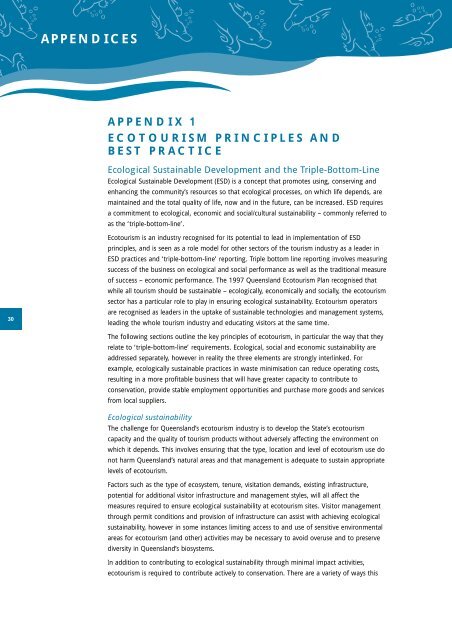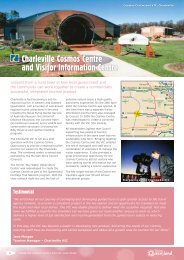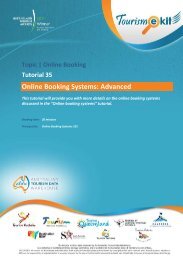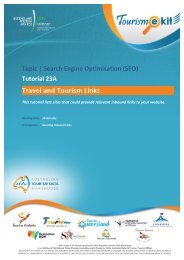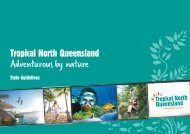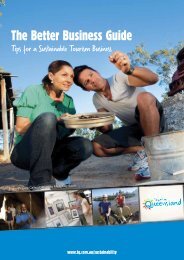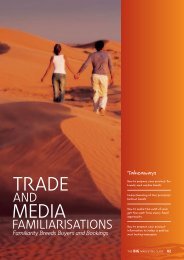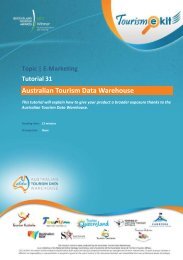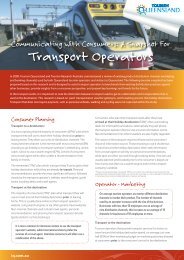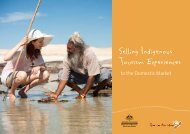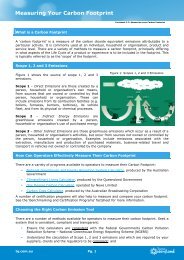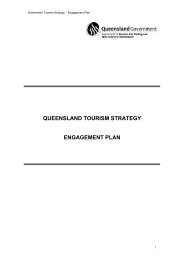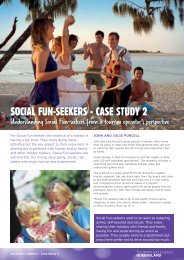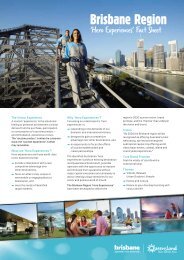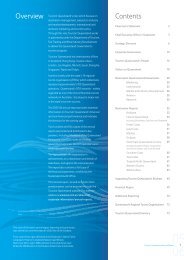Queensland Ecotourism Plan 2003-2008 - Tourism Queensland
Queensland Ecotourism Plan 2003-2008 - Tourism Queensland
Queensland Ecotourism Plan 2003-2008 - Tourism Queensland
Create successful ePaper yourself
Turn your PDF publications into a flip-book with our unique Google optimized e-Paper software.
APPENDICES<br />
Appendix 1<br />
<strong>Ecotourism</strong> Principles and<br />
Best Practice<br />
Ecological Sustainable Development and the Triple-Bottom-Line<br />
Ecological Sustainable Development (ESD) is a concept that promotes using, conserving and<br />
enhancing the community’s resources so that ecological processes, on which life depends, are<br />
maintained and the total quality of life, now and in the future, can be increased. ESD requires<br />
a commitment to ecological, economic and social/cultural sustainability – commonly referred to<br />
as the ‘triple-bottom-line’.<br />
30<br />
<strong>Ecotourism</strong> is an industry recognised for its potential to lead in implementation of ESD<br />
principles, and is seen as a role model for other sectors of the tourism industry as a leader in<br />
ESD practices and ‘triple-bottom-line’ reporting. Triple bottom line reporting involves measuring<br />
success of the business on ecological and social performance as well as the traditional measure<br />
of success – economic performance. The 1997 <strong>Queensland</strong> <strong>Ecotourism</strong> <strong>Plan</strong> recognised that<br />
while all tourism should be sustainable – ecologically, economically and socially, the ecotourism<br />
sector has a particular role to play in ensuring ecological sustainability. <strong>Ecotourism</strong> operators<br />
are recognised as leaders in the uptake of sustainable technologies and management systems,<br />
leading the whole tourism industry and educating visitors at the same time.<br />
The following sections outline the key principles of ecotourism, in particular the way that they<br />
relate to ‘triple-bottom-line’ requirements. Ecological, social and economic sustainability are<br />
addressed separately, however in reality the three elements are strongly interlinked. For<br />
example, ecologically sustainable practices in waste minimisation can reduce operating costs,<br />
resulting in a more profitable business that will have greater capacity to contribute to<br />
conservation, provide stable employment opportunities and purchase more goods and services<br />
from local suppliers.<br />
Ecological sustainability<br />
The challenge for <strong>Queensland</strong>’s ecotourism industry is to develop the State’s ecotourism<br />
capacity and the quality of tourism products without adversely affecting the environment on<br />
which it depends. This involves ensuring that the type, location and level of ecotourism use do<br />
not harm <strong>Queensland</strong>’s natural areas and that management is adequate to sustain appropriate<br />
levels of ecotourism.<br />
Factors such as the type of ecosystem, tenure, visitation demands, existing infrastructure,<br />
potential for additional visitor infrastructure and management styles, will all affect the<br />
measures required to ensure ecological sustainability at ecotourism sites. Visitor management<br />
through permit conditions and provision of infrastructure can assist with achieving ecological<br />
sustainability, however in some instances limiting access to and use of sensitive environmental<br />
areas for ecotourism (and other) activities may be necessary to avoid overuse and to preserve<br />
diversity in <strong>Queensland</strong>’s biosystems.<br />
In addition to contributing to ecological sustainability through minimal impact activities,<br />
ecotourism is required to contribute actively to conservation. There are a variety of ways this


